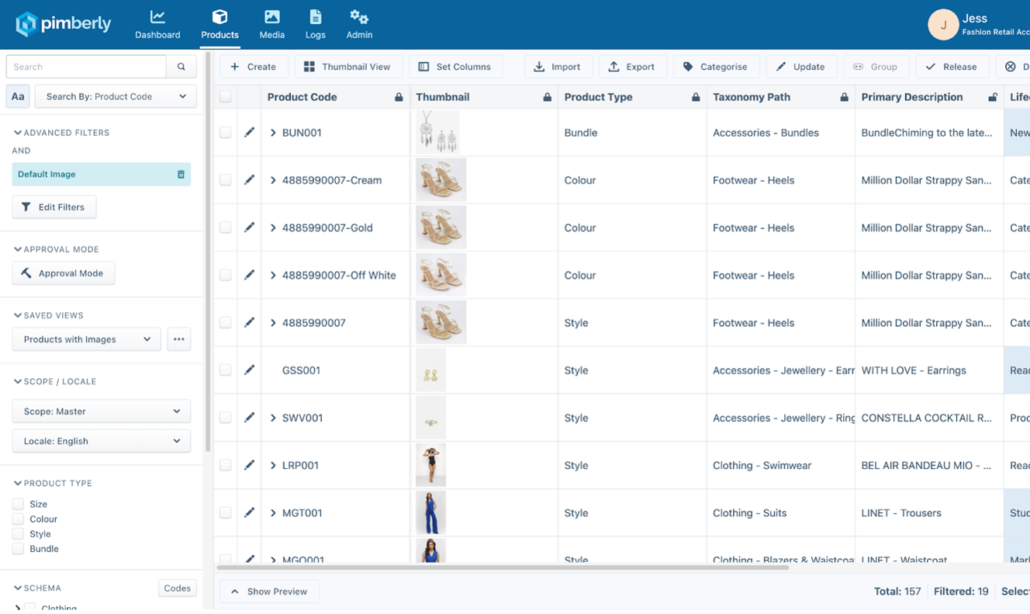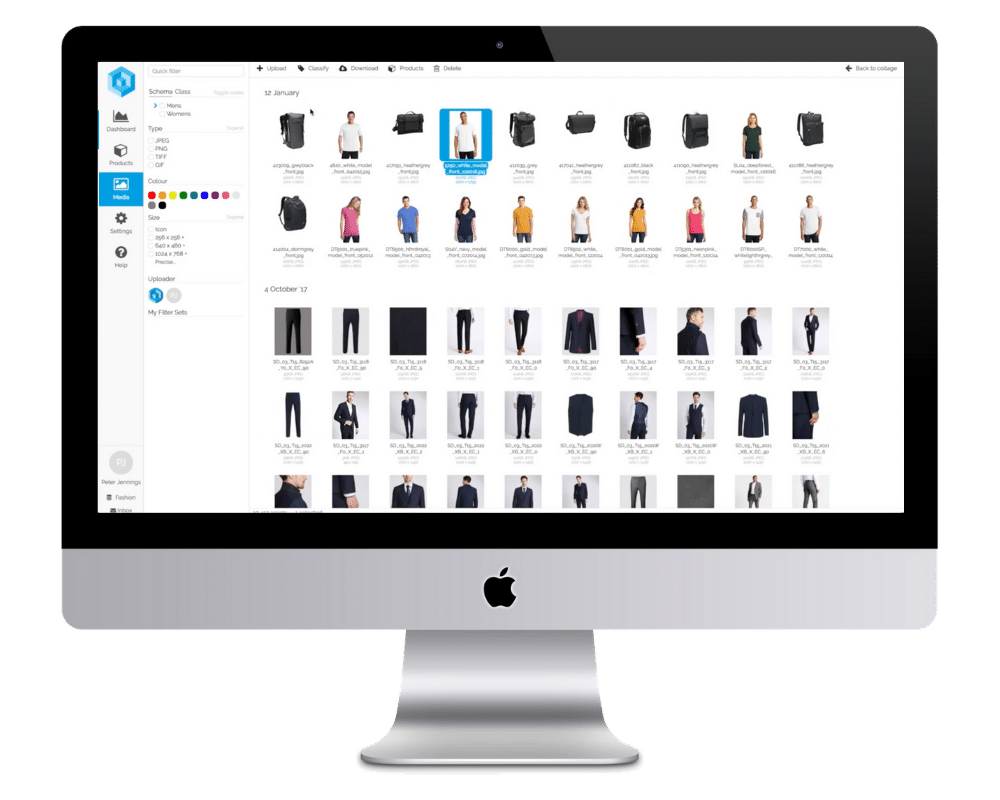Table of Contents
1. Manage product data from a central hub and accelerate time to market
Ensuring that your data is high quality can be tricky when you’re managing it in a software designed for other functions
We know BigCommerce has amazing benefits – from an intuitive dashboard to extensive API limits – but product data management isn’t its intended purpose. Instead, combining PIM and BigCommerce gives merchants time to do what they enjoy: sell products!
So, if you’re managing thousands of SKUs, you need the right tool to complement BigCommerce’s powerful functionality. This is where PIM steps in for effective BigCommerce store management.
PIM: Your central source of truth
Ultimately, it’s the caliber of product information governing the quality of the customer experience. Managing huge amounts of product data in the backend of BigCommerce or disparate systems (spreadsheets/ERP) means you don’t have a complete view over the accuracy of your product data
As the volume of your product data grows and grows this only gets trickier. In the long run, poor product information negatively impacts the quality of the customer journey.
The good news is Pimberly provides BigCommerce merchants with a single source of truth. From this, merchants have functionality to maintain product information and create amazing product experiences.
How to add products to BigCommerce & validate product data with automation tools
As well as ingesting your product information from a variety of data sources, Pimberly comes with a variety of tools to standardize and enrich it. These include:
Worfkflows:
Pimberly Workflows manage immense complex structures. For instance, Workflows enable BigCommerce merchants to create different scopes for the same product for each sales channel (BigCommerce multistorefronts, marketplaces, etc.).
As an example, you can push out the same product to both your BigCommerce store and Amazon with different product descriptions. This means you make sure products being pushed to Amazon are aligned with its unique SEO requirements. And, product releases align with your brand’s tone of voice across your BigCommerce stores.
Workflows also ensure BigCommerce merchants have correct approval processes in place before releasing products across storefronts. This added layer of security ensures you avoid costly fines or penalties when expanding into new marketplaces.
Lifecycles:
With Pimberly, BigCommerce merchants have enhanced control over product releases. This is because the platform comes out-of-the-box with staging and lifecycle functionality.
In other words, products in Pimberly aren’t released to your BigCommerce store until each stage of the product lifecycle is met. This makes it straightforward for teams across the business to see which products are ready to be launched (and which aren’t quite ready yet!).
Additionally, the Pimberly-BigCommerce Connector is event driven, so as soon as product completes its lifecycle, it goes live near-instantly.
With 40% of product returns attributed to incorrect product information, Pimberly’s data governance tools ensure the completeness and accuracy of your data quality in your BigCommerce store.
Blog
5 Reasons BigCommerce Merchants Love our PIM Connector
Drive growth with Pimberly + BigCommerce
2. Use Digital Asset Management (DAM) for operational efficiency
Another major feature is Pimberly’s Digital Asset Management (DAM) capabilities. To expand, Pimberly also processes the collection and enrichment of media assets, auto-assigning them next to the correct product in your BigCommerce store.
Easily match BigCommerce’s digital asset requirements
Pimberly’s DAM automatically converts images to suit the requirements of your BigCommerce store (NB: BigCommerce recommend product imagery is 1280 x 1280 pixels).
This means, your images will be auto-optimized to ensure fast-load times and a better customer experience. This is because Pimberly’s automation ensures your product imagery and digital assets in line with BigCommerce best practices. Remember, oversized images damage your ranking on Google, so your products will get discovered more.
Furthermore, automatic conversion means your team spends less time on repetitive tasks. Improve productivity and let Pimberly’s automation do the bulk of the heavy lifting for your BigCommerce store!
Amazing product experiences with product data management for BigCommerce
In a 2023 survey, 67% of customers stated high definition visuals are more likely to influence a buying decision than product descriptions. So, the role digital assets play in the customer journey shouldn’t be ignored.
Business-wide centralized access to digital assets makes it easier for your team to manage data and digital assets, ensuring consistency across your product range. After all, up-to-date, consistent, and high-quality digital assets will only improve the customer experience.
3. Harness personalization for bespoke shopping experiences
With 91% of surveyed consumers saying they’re more likely to shop with a brand offering personalized product recommendations, personalization is clearly something to incorporate in your BigCommerce strategy.
Pimbery Kits & Bundles: Increase revenue by cross-selling and up-selling
With Pimberly, merchants easily manage complex relationships to create product sets that make sense to online shoppers and their needs.
However, if you’re using spreadsheets or SharePoint to manage product data, making product kits and bundles is virtually impossible. With Pimberly, managing metadata to create intelligent product kits and bundles is straightforward.
This is because PIM provides you with complete visibility over the product data at every level. PIM will help by consolidating BigCommerce product data, forming the backbone of personalized shopping experiences.
Examples of product kits and bundles include selling related accessories. For instance, a computer and tech retailer will feature a product page for a laptop. On the product page, there’ll be a section containing related items such as laptop bags or mouse pads. As a result of this, the retailer’s average order value skyrockets and the personal touch creates a streamlined customer journey.
Or, you should highlight a product with improved features and a higher performance. Up-selling products like this is a great way to increase revenue. In addition, intelligent BigCommerce product recommendations position your brand as having a solid knowledge of your niche.
4. Leverage powerful AI functionality
Designed to help BigCommerce merchants save time, Pimberly’s AI functionality streamlines business efficiency.
Autogenerated product descriptions to increase sales and save time
Pimberly’s newest AI tool automatically generates BigCommerce product descriptions, saving merchants tons of time. All users have to do is select the character limit, tone of voice, and include any keywords and it will produce product descriptions suitable for BigCommerce product listings.
Near-instantly, the platform will playback three versions for you. After making any quick edits, merchants can send it live, allowing you to expand product ranges much quicker.
Eliminate data inaccuracies with ProductAI
Pimberly’s ProductAI is a market intelligence tool with access to marketplaces such as Amazon, eBay, and Walmart. ProductAI is able to find products – through EAN, UPC, or ASIN codes – and source all relevant product data and digital assets. Then, it ingests the data into Pimberly before pushing it to your BigCommerce store.
Furthermore, ProductAI will also pull through product categorization, BigCommerce product attributes, and taxonomy classification. ProductAI is a great way to plug gaps in your BigCommerce data, making product onboarding more seamless.
Key Points
- Pimberly functions as a central hub, providing you with a fit-for-purpose interface for managing and enriching product information, suitable for your BigCommerce store.
- Data governance tools accelerate your time-to-market, ensuring your product data is accurate and consistent.
- Enhance customer experiences by harnessing Pimberly’s Digital Asset Management (DAM) capabilities to curate amazing product experiences across BigCommerce storefronts.
- Pimberly facilitates product recommendations and personalized BigCommerce related products, configured through product metadata. You’ll consistently create compelling experiences with BigCommerce product personalization.
- Powerful AI tools will auto-generate product descriptions and fill gaps in your product data for improved product data management for BigCommerce.













